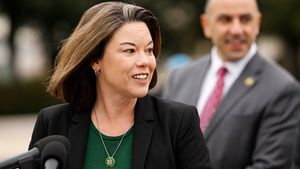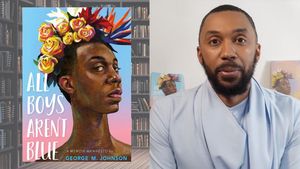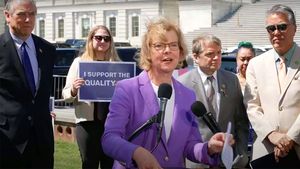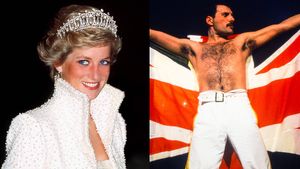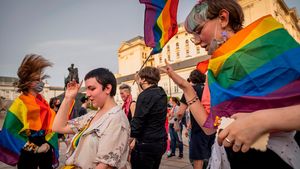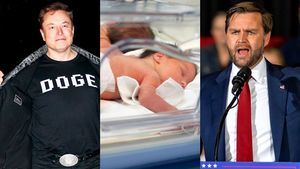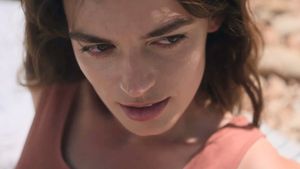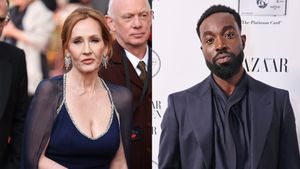Photography by Perry Ogden | Styling by Gaelle Paul
Meeting Adele can be discombobulating. She's a global sensation whose latest album, 21, has broken records left, right, and center, but to call her a pop star seems, somehow, to miss the point of someone so lacking in ego, so resolutely determined to downplay her celebrity -- even when that someone is the first living artist since the Beatles, in 1964, to have had two albums and two singles in the British top 5. "I always say I'm a singing lady, rather than a singer," says Adele. "Singer is a big word for me. My interpretation of a singer is Etta James and Carole King and Aretha Franklin."
It is a sunny day in Amsterdam, and Adele is in her pajamas, her long hair splayed out around her head, a cigarette dangling from one hand (she smokes 20 a day). Boats float by on the canal just below us; on one, a trio of adolescent girls starts squawking, "Are you Adele?" and collapse into gasps and sighs when she flashes them a corroborating smile. Later, she will perform to a frenzied crowd in Paradiso, a converted church booked before it was clear that she could fill venues many times the size. It's a story that's been repeated across Europe: venues too small to accommodate her exploding career. "We're playing Shepherd's Bush in London, and I didn't even think I'd sell that out," she says of the 2,000-capacity venue. "It went in about 10 seconds. It's still hard to take it all in. Every now and then I wonder when it's going to slow down." She says she's lost a few friends "who just don't get it and treat me weird," but that she has managed to maintain her identity and keep sight of the things that count. "I've met people I admire, and people I don't admire who are completely affected by their success, and I fucking hate them," she says. "There's so many people who believe their own hype and treat people like shit, and if I was ever like that I would absolutely stop doing what I'm doing for a while and go and find myself again. I find it grotesque when people change because of it, but maybe it's because they're not as good at keeping in contact with the people who love them for a reason."
It may be premature to claim that Adele stands comparison with any of her idols, but at 23, it's clear that she is something special. She wrote her breakout single, "Hometown Glory," in 10 minutes -- when she was 16 -- after a row with her mom, who wanted her to leave home for university. It was released in 2007, just 500 copies, in vinyl. Two years later she walked away from the 2009 Grammys clutching two awards -- for Best New Artist and for her single "Chasing Pavements." Her shoes were off and her belt was undone when the announcement was made. "I had just come back from the toilet, so my Spanx weren't even all the way up," she recalls. "Then I won Best New Artist, and it was like time slowed down, and I was hovering over myself, pissing myself laughing. It was amazing."
Adele talks a lot like this, in quick-fire sentences and a broad "oh my bleedin' gawd" Cockney that rolls merrily along, challenging you to keep up. When I transcribe our conversation, I have to set the playback speed to slow in order catch it all. Lots of things are "brilliant" or "amazing," or more often "fucking brilliant" and "fucking amazing." She cackles like a hyena. On stage that evening she will address her perplexed Dutch fans in the same way, peppering them with anecdotes about her wiener dog, Louis Armstrong, her mom's paragliding excursion to Spain, and a "crispy tissue" she received in her fan mail ("There was a note saying, 'This is what I imagine you doing to me.' Oh, you sent me a crispy tissue -- I'll definitely get in touch with you; hey, let's get married and have children!"). And then, out of nowhere, she'll launch into a song, and it's as if Henry Higgins had staged an intervention. Her big, supple voice fills the space, and keeps on filling it. It's a voice that could raise the proverbial roof, the kind of voice you feel you could listen to for a very long time and still come back for more.
Where did it come from, this miraculous talent to create these contagious songs? Heartbreak, obviously, but also an instinct for putting it into words that makes her seem preternaturally wise. For someone who hasn't read a book in more than 10 years -- "and that was a Jacqueline Wilson [children's] book" -- Adele has an uncommon gift for writing. She thinks it may have something to do with the way she learned to express her feelings as a child. "I don't know if it's because I'm an only child, but I was never, ever good at saying how I felt about things," she says. "From the age of about 5, if I was told off for not sharing, or I didn't tidy my room, or I spoke back to my mom, I'd always write a note as my apology." Those notes, hundreds of them over the years, became a mechanism for examining her feelings, and a forerunner of the two albums that would spin those feelings into gold. What else are the songs that fill her first, 19, and second, 21, but letters of regret and disappointment?
And then there was music itself. Adele Adkins, to use her full name, was 3 years old when she saw her first concert, accompanying her mom, Penny, to see the Cure. One of their numbers, "Lovesong" -- a hit for the band in 1989, the year Adele was born -- would end up as a cover on 21, a tribute to the mother whose musical enthusiasms have done so much to instruct and inspire her daughter. Growing up in the London borough of Tottenham, one of the most impoverished communities in England, was not easy, and mother and daughter struggled alongside everyone else. Music was a way to escape the grind. "Even when I was 10 and 11, I knew my mom had brilliant taste in music -- I just wasn't ready to embrace it," says Adele. "Now they're my favorite artists." She has thought about recording a cover of "Troy," by Sinead O'Connor, the first song that ever made her cry, and another favorite of her mom's, but doubts her ability to deliver it. "As an artist she is everything I would like to be--it's all about the song," says Adele. "She moves me when I hear her."
Adele has always gravitated to the melancholy in music. While her mom was playing the Cure, young Adele was transfixed by Lauryn Hill, whose 1998 album, The Miseducation of Lauryn Hill, was similarly inspired by a relationship that went sour. Adele recalls belting out Hill's "Ex-Factor" when she was 10, "with so much passion that my mom was, like, 'Do you know what this song is about?' and I was like, 'Nah, not really.' " But if the meaning of the lyrics eluded Adele, their emotional depth registered. "I remember having the sleeve notes -- no one has sleeve notes anymore -- and reading every lyric and not understanding half of them, and just thinking, When am I going to feel like this? When am I going to be able to write and sing like this?" She thinks she might still be singing Beyonce trills ("not that there's anything wrong with that -- she's my fucking idol -- but still you need to branch out") if not for the Brit School, spawning ground for a string of musical talents, including Amy Winehouse, Leona Lewis, Katie Melua, Kate Nash, and the U.K's latest export, Jessie J (Jessie, Adele, and Leona were in the same year). She was 14 when she was accepted, and 18 when she left. In the four years between she learned her craft. "A lot of people feel trapped by youth, but at Brit I felt fucking alive," she says. "They taught us to be open-minded, and we were really encouraged to write our own music, and some of us took that seriously, and some of us didn't. I took it very seriously." She wrote "Hometown Glory" first, and then "Daydreamer" -- about a bisexual boy she fell in love with. By the time she left she had three demo songs on MySpace and a recording contract. "I didn't have to face the real world -- everything fell into my lap," she says. "I've been very fortunate."
That's one interpretation, but Adele is the first to acknowledge the irony of securing her professional success by singing about her personal failures. "I don't think I'll ever forgive myself for not making my relationship with my ex on 21 work, because he's the love of my life," she says, before adding that she would have been willing to give up everything for him. Everything? "Well, I would still be singing in the shower, of course, but yeah -- my career, my friendships, my hobbies. I would have given up trying to be the best." Instead of giving up her career she has cemented it. "He made me really weak, but at the same time really fucking fearless, so I managed to channel that. I don't know if I'll ever beat this album in terms of how people connect to it."
To see Adele perform live is to realize the wisdom of Rick Rubin, one of the producers of 21, which was recorded in Malibu. They met on the set of Saturday Night Live in 2008, when Adele performed songs from 19, and the two clicked (it was the same night that Sarah Palin was featured as a guest, so the ratings were astronomical). After Rubin saw her perform at the Hollywood Bowl he told her she needed to find a way to infuse her records with the same quality she brought to her live performances, that visceral immediacy that makes her recent single "Someone Like You" such a punch in the gut. "As soon as I met him he just got it," says Adele. "I didn't even have to say what I wanted. He just knew straight away. We were literally locked down in the studio, in a good way. It was just all about the song, which is something that will follow me forever." (Though she loved working with Rubin, Malibu was another story. "I was hoping to make some local friends, maybe find a nice organic cafe, things like that," she says. "Everyone lives behind a gate, and they're so fucking rich they never have to leave, so I didn't meet anyone.")
Her ascent since 21 was released here in February has been so rapid that she is still playing catch-up to the less savory aspects of celebrity. In Cologne she was freaked out by a camera-wielding fan who didn't know when to back off, and following the incident of the crispy tissue, her mail is now prescreened. Mostly, however, the fan mail is of a more rewarding kind. "I get a lot of mail from people who tell me that I make them really happy to be themselves, and really comfortable with who they are, which I love," she says. "I would hate it if someone was, like, 'I wish I was you' because I'm as insecure about myself as the next person." In what way? "Just that I'm not good enough -- in my music, in my relationships, and that I'm never going to be brave enough to tell someone how I feel." It's an illuminating admission for someone whose songs speak so plainly and powerfully, but for Adele, as perhaps for her audience, songs are capable of scaling mountains beyond the limits of regular speech. A few nights earlier, in Brussels, a young gay kid thanked her for giving him the strength to come out. "He fancied someone at school, but he wasn't out. And he listened to 'Someone Like You' and came out to his best friend and then to the boy he fancied, and it turned out that he was gay as well, and now they're together -- he's like 15. I had to leave so I didn't burst into tears."
Ah, yes, that song. Every artist has a signature, and it's hard to believe that Adele will outdo the one that closes 21. If "Chasing Pavements" signaled her arrival in 2009, it was "Someone Like You" that proved she had staying power. Her heart-wrenching performance at the Brit Awards in February, alone at a piano, seemed a kind of miracle amid the pyrotechnics of the night's other performances. That was on a Tuesday; within a week the single had rocketed up the British charts, beating Lady Gaga's "Born This Way" to claim the top spot: " 'Don't forget me,' I begged/ 'I'll remember,' you said/ Sometimes it lasts in love/ But sometimes it hurts instead."
Adele wrote that verse two years ago, as her second big relationship crumbled. She remembers turning up to meet her producer and co-writer Paul Epworth (Florence and the Machine, Sam Sparro, Bloc Party) the morning after the break-up. "I never get angry, but I was ready to murder -- I went in crying and stuff, and said, 'Let's write a ballad.' Paul was, like, 'Be a bitch about it. You have to be hard-nosed.' " The song that actually emerged was "Rolling in the Deep," the album's first single, and her first hit in the United States, where it's been embraced by mainstream radio that didn't know what to do with her earlier singles. A lot has changed since then. Gaga, for one thing, has remade the musical landscape by bringing spectacle back to pop. Against the flash and splash of Gaga, Katy Perry, et al, the stripped-back, soulful style of Adele risked being lost. In fact, the volume of everything else has made her spare, acoustic sets all the more striking. "My music's not stylized--it's not sold by image, or by my sexuality, or aloofness, or anything like that," she says. "I think it would be really bizarre if I started doing gimmicks and stunts -- it wouldn't suit my music." Nevertheless, she finds performing nerve-wracking and won't do big festivals like Glastonbury. "I've got lots of friends who are artists and they love it. They're, like, 'I was born to perform,' and I'm like, 'Fuck off -- no one's born to perform.' " She points to the canal bank opposite: "That's like standing over there naked."
Between 19 and 21, and between 19 and 21, Adele says she evolved. "The difference between the first and second album is that I was more philosophical about it all the second time, and I'm hoping that if I'm happy I can embrace it enough to write a record about it." But even she seems to consider this a dubious scenario, breaking into a cackle almost as soon as the sentence has left her mouth. "It would be fucking awful if my third album was about being happily settled down, and maybe on my way to being a mom, and all the critics were, like, 'Yeah, it's fucking shit. Can you be miserable, please?' And all the fans were going, 'I just don't like you anymore. I don't bond with you anymore.' "
It seems unlikely that Adele will be writing about happiness any time soon. Although she quips that she sometimes finds herself "thinking about Ikea, or something" in the midst of singing one of her devastating break-up songs, it's clear that her feelings of loss and sorrow haven't been fully cauterized by writing about them. How else to explain her tears when she sang "Someone Like You," first on the U.K.'s Later ... With Jools Holland last fall, and then again at the Brits? The song wasn't even slated as a single until the Jools Holland slot revealed its power to connect with her audience. When she sang it again at the Brits she says she pictured her ex sitting at home watching her performance with a certain satisfaction, thinking, Wow, right under my thumb, she is. But in almost the same breath she adds that she hopes he's proud of her. Does she believe in the concept of a soul mate? "Absolutely. He was my soul mate. We had everything -- on every level we were totally right. We'd finish each other's sentences, and he could just pick up how I was feeling by the look in my eye, down to a T, and we loved the same things, and hated the same things, and we were brave when the other was brave and weak when the other one was weak -- almost like twins, you know -- and I think that's rare when you find the full circle in one person, and I think that's what I'll always be looking for in other men." An assistant recently passed on some advice from a Brazilian lady she knows: "You will hurt until you stop hurting." Adele laughs at the Zen simplicity of this. "I'm trying to make that my new motto -- it will hurt until it stops hurting," she says. It just hasn't stopped yet.
To view a slide show of exclusive Adele photos, click here.







